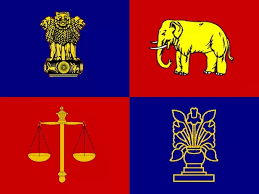Article 52 of the Constitution lays down that there shall be a President of India. Further Article 53(1) provides that the executive powers of the union shall be vested in the President. Thus the President of India is the Head of State and the Chief Executive. The executive powers of the Union are in the hands of the President. He exercises these either directly or through officers subordinate to him in accordance with the law. The officers subordinate to him, include ministers also. However, being the head of a parliamentary system, he is only a constitutional/titular head and exercises nominal power.
The President always acts in accordance with the advice of the Council of Ministers and the Prime Minister. All his powers are really used by the Prime Minister and the Union Council of Ministers. The President holds the highest office in India, represents the sovereignty of India, enjoys the highest position and plays a valuable part in the working of the Indian Constitutional system.
Administrative Powers:
The President is the head of executive and of the administration of India. All executive powers have been vested in him. All executive actions of the Government of India are taken in the name of the President. He gets the administration run by the Council of Ministers. In performing all his functions, the President follows the advice of the Prime Minister.
All orders and other instruments made and executed in the name of President are to be authenticated in such manner as may be specified by him. The validity of an order or instrument which is so authenticated cannot be called in question on the ground that it is not an order or instrument made or executed by him. (Article 77(2)).
Power of Appointments:
The President has power to appoint
- The Prime Minister and other ministers shall be appointed by the President on the advice of the Prime Minister (Article 75(1)).
- Attorney General for India (Article 76);
- The judges of the Supreme Court (Article 124);
- The judges of the High Courts (Article 217);
- Comptroller and Auditor General of India (Article 148);
- Governors of States (Article 155);
- Finance Commission (Article 280);
- Election Commissioners (Article 324);
- Members and Chairman of Union Public Service Commission (Article 316);
- Joint Public Service Commission for a group of states (Article 316);
- Commission to investigate on the condition of Backward Classes (Article 340);
- Commission to report on the Administration of Scheduled Areas (Article 339);
- Special officers for Scheduled Castes and Scheduled Tribes (Article 338);
- Commission and Committee of Parliament on official language (Article
341). - A Commission on language (Article 344);
- An Inter-State Council (Article 263).
Powers of Removal:
The president has the power to remove
- The Ministers (Article 75(2);
- The Attorney General of India (Article 76 (4));
- The Governor of a State (Article 156 (1)).
Role in Foreign Relations:
As the Head of the State, the President sends India’s ambassadors and envoys to foreign countries. He receives the foreign ambassadors in India. All diplomatic relations takes place in his name. All International Treaties are negotiated and signed by the Government of India in the name of the President.
Supreme Commander of the Armed Forces:
The President shall be Supreme Commander of the Defence forces and the exercise thereof shall be regulated by law and Parliament shall have the power to regulate or control the exercise of military powers by the President. He grants all military honours and titles for acts of bravery and commendable service to the nation.
